

'Black Monday'; well this is what Indian investors & buyers are terming August 5, 2024, after the Indian Stock market nosedived last Friday. On Friday, the Indian stock market crashed heavily after the United States witnessed a freefall in the stock market. As a result, the Stock Market Crash was among the most talked about points on social media, and investors-buyers from all around the world started following the US Stock Market as it was one of the factors why the Indian stock market was witnessing a dip. On Monday (today), situations are also looking grim for the stock market as the Sensex and Nifty have nosedived in the pre-open. The Sensex opened at 78,588.19 against its previous close of 80,981.95 and soon crashed 3 percent to the level of 78,580.46.
On the other hand, the Nifty 50 opened at 24,302.85 against its previous close of 24,717.70 and dropped over 2 percent to the level of 24,192.50. Now, the question arises why the Indian stock market is witnessing a sharp dip? Below is what you should know-
One of the reasons contributing to the Indian stock market crash is the fear of recession in the United States. A big drop in the manufacturing PMI data in America has been witnessed which indicates that there may be a recession in the US. Along with this, there has been a record increase in the number of unemployed, which has directly affected the American market. At the same time, the announcement of layoffs in the IT sector has also deepened the crisis, due to which the global IT sector is also under heavy pressure. For instance, chip-maker company Intel announced 15,000 job cuts in a note to employees. As a result, many fear that Intel layoffs may start another domino effect, meaning- more IT giants may announce mass layoffs.
The third reason that somehow contributed to the market crash was Japan increasing its interest rates. For the unversed, the Bank of Japan (BOJ) on Wednesday (Jul 31) raised interest rates to 0.25 percent. It sent a wave of volatility through the market, with the Topix jumping 1.5 percent on the day, only to plunge on both Thursday and Friday. The move came hours before the US Federal Reserve announcement of interest rate.
Japan's Central Bank's interest hike resulted in YEN gaining 10% against the dollar in just over three weeks. This led to the unwinding of yen-funded carry trades In general, Yen is considered a safe haven for investors, they borrow in Yen due to its stable, low interest rate and deploy in other high-yielding currencies. Hence, gaining from the difference. With the hike in interest rate, the YEN itself went up in value causing distress in the global stock market.
As per reports, last Friday investors suffered a loss of Rs 4.56 lakh crores. Due to the huge fall in the Sensex, the market cap of BSE fell by 4.56 lakh crores to 457.06 lakh crores on Friday. In such a situation, it can be said that the valuation of investors under BSE fell by 4.56 lakh crores on Friday.
Notably, many high-end stocks suffered heavy losses. 28 out of 30 BSE stocks opened in the red. Among the large-cap companies that felt burnt of the stock market crash were-, Tata Group's automobile company Tata Motors' share. It was trading with a decline of 4.28%, Tata Steel Share 3.89%, Maruti Share 3.19%, Adani Port Share 3.26%, JSW Steel Share 3.21%, SBI Share 3.19%, M&M Share 3.15%, Titan 3.10%, LT Share 3% and Reliance Share 2.27%.
With a potential war between Israel & Iran is looming, Israeli shares fell sharply on Sunday, catching up with weakness in world markets and reflecting the continued threat of attacks from Iran. As per reports, investors started to sell Israeli shares in the market and this dented the stock market around the world.
Many American analysts have signaled a red flag saying that the US might be slipping into recession and till January 2025, the country may accept it. Warning over US recession came after a weak jobs report pointed to a rise in the unemployment rate to 4.3%. The new data from the Labor Department triggered the Sahm Rule, which indicates the likely start of a recession once the unemployment rate’s three-month moving average exceeds that measure’s lowest point over the trailing 12 months. Furthermore, the US IT companies are not stopping from mass layoffs despite the White House maintaining that all is well in the US economy.
For those who are unaware, a recession is a significant decline in economic activity across the economy, lasting for an extended period, typically visible in GDP, real income, employment, industrial production, and wholesale retail sales. It is often defined as two consecutive quarters of negative economic growth. Recessions can result from various factors, including reduced consumer and business spending, high unemployment, and financial crises.
(Disclaimer: Before making any investment or selling any stock, consult your financial advisor)